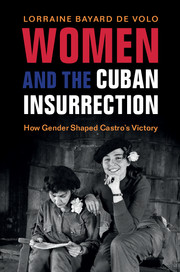Book contents
- Women and the Cuban Insurrection
- Women and the Cuban Insurrection
- Copyright page
- Dedication
- Contents
- Preface
- 1 Revolution Retold
- 2 “How Can Men Tire When Women Are Tireless?”
- 3 A Movement Is Born
- 4 Abeyance and Resurgence
- 5 Gendered Rebels
- 6 War Stories Celebrated and Silenced
- 7 “Stop the Murders of Our Children”
- 8 Masculinity and the Guerrilla War of Ideas
- 9 Women Noncombatants
- 10 Las Marianas
- 11 Past Is Prologue
- Bibliography
- Index
7 - “Stop the Murders of Our Children”: Mothers and the Battle for Hearts and Minds
Published online by Cambridge University Press: 19 January 2018
- Women and the Cuban Insurrection
- Women and the Cuban Insurrection
- Copyright page
- Dedication
- Contents
- Preface
- 1 Revolution Retold
- 2 “How Can Men Tire When Women Are Tireless?”
- 3 A Movement Is Born
- 4 Abeyance and Resurgence
- 5 Gendered Rebels
- 6 War Stories Celebrated and Silenced
- 7 “Stop the Murders of Our Children”
- 8 Masculinity and the Guerrilla War of Ideas
- 9 Women Noncombatants
- 10 Las Marianas
- 11 Past Is Prologue
- Bibliography
- Index
Summary
In honor of Mother's Day 1957, thirty-seven Cuban mothers who had lost a rebel son or daughter claimed, on the basis of “tears and innocent blood shed,” the right to speak and be heard, calling on Cuban women “to safeguard Cuba, to protect other mothers from suffering this agony”:
For a woman there is nothing that can be compared to the life of a son, a brother, a husband, and this is the time to prove it. Thus we appeal to our sisters to aid in the crusade for redemption which will detain the river of blood and tears which drown us … It is essential that this Mother's Day should set the date on which the Cuban mothers join together to raise their voices as one and say to the government: ENOUGH.
In an insurrection so closely associated with bearded young men in olive green fatigues, this maternal call to action is a dramatic counterpoint. Given that two decades later, the Nicaraguan and Salvadoran revolutionary movements would include robust maternal organizations, and the mothers of the disappeared in Chile and Argentina would help bring down dictatorships, it is not surprising to find middle-aged Cuban women mobilized in the insurrection, particularly as mothers. However, apart from a few photos and anecdotes, revolutionary Cuba has not included maternal protest as a prominent part of its war story, nor have these protests or the middle-aged and older women marching in them received much attention in the literature. A variety of factors converge to create this gap: the Cuban revolution idealized youth; guerrilla warfare in the Sierra was privileged over the llano and the war of ideas; and men's contributions were valued over women's. By exploring women rebels over the age of thirty-five – their backgrounds, their paths to activism, and their modes of participation – this chapter challenges these dominant narratives, revealing an insurrection that was generationally diverse, waged significantly through ideas, and with valuable contributions by women.
Drawing from testimonials, memoirs, rebel propaganda, US State Department communiqués, and post-1958 Cuban media interviews, this chapter examines these women from three angles.
- Type
- Chapter
- Information
- Women and the Cuban InsurrectionHow Gender Shaped Castro's Victory, pp. 144 - 164Publisher: Cambridge University PressPrint publication year: 2018

